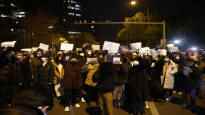The economic impact of China’s protests depends on whether the protests spread. If this happens, there may be more cracks in the production chains that extend all the way to Europe.
We don’t want covid tests, we want freedom.
That’s what the protesters shouted on Sunday evening in the Chinese capital, Beijing. China’s strict corona policy and continuous restrictions are now testing people’s patience in an unprecedented way. In addition to Beijing, opinions have been expressed in Shanghai, among others.
It is still difficult to assess the economic effects of the protests at this stage, says a senior economist at the Bank of Finland’s Emerging Economies Research Institute Juuso Kaaresvirta and the chief economist of the banking group Nordea Wind Birch.
China is the world’s second largest national economy, the importance of which has also increased in Finland’s foreign trade in recent years.
– When people show their opinion on the weekend, it doesn’t necessarily mean anything from the point of view of the economy if people go to their workplaces on Monday, says Kaaresvirta.
If the demonstrations during the first week spread, the protests will also start to have more economic effects, Kaaresvirta estimates. In this case, uncertainty increases and, for example, production chains that extend all the way to Europe may experience cracks.
– If people don’t come to work, work will stop and the wider production chains will be interrupted. Then there may be more problems with the availability of components, for example. However, this is still a long way off.
“Internal instability always causes uncertainty”
China’s protests will bring more nervousness to the financial market, Koivu estimates.
The main stock indices of Hong Kong and Shanghai saw a slight decrease during the day on Monday. Stock markets in Europe also opened in bearish mood.
– Internal instability always causes uncertainty. Financial markets are waking up again to what the stability situation of the Chinese system is after all.
Protesters have even shouted down the Chinese Communist Party and its leader Xi Jinping against slogans, which is really rare in China.
However, Koivu does not believe that the demonstrations will at least further darken China’s economic prospects.
The strict corona line has harmed the economy
The protests started when news spread late last week that ten people had died in a fire in Xinjiang’s capital, Ürumqi. Corona restrictions are suspected to have influenced the deaths.
China’s strict corona line and continuous restrictions have also been a stumbling block for the country’s economy for a long time. They are the main reason why China’s economic outlook is so weak now.
Will the protests make China’s corona line turn around?
Koivu and Kaaresvirta do not believe this.
– I would see it as more likely that, unfortunately, the demonstrations will be defeated by force rather than the corona line being abandoned, says Kaaresvirta.
Also according to Koivu, it is unlikely that China will give up the corona restrictions quickly. This is because a large part of the Chinese population is still unvaccinated.
– The Chinese population and especially risk groups are still vulnerable to the spread of the virus. We would even get a path out of the corona measures now. For many, that would already be a signal that there is light at the end of the tunnel.
The corona restrictions have weakened Chinese consumers’ confidence in the economy and made it difficult for companies to operate. In Finland, trade with China is particularly important in the fields of commerce and industry.
China has traditionally been the growth engine of the world economy, but this year the country’s economic growth is expected to slow down dramatically.
Throughout the summer and autumn, there has been a lot of discussion in Europe about the dependence on China and the related risks due to the Russian attack.
– We have talked a lot about geopolitical risks and possible Chinese sanctions. However, the most important China risks for many companies arise specifically from within China, says Tuuli Koivu.
The subject can be discussed until Tuesday, November 29 at 11 p.m.
Read more:
The corona protest continued late into the night in Beijing – a BBC journalist was arrested and beaten in Shanghai on Sunday
“Bad news for the whole world”, says an economist about the announcement of the Chinese Party Congress – investors were also frightened by the new appointments
